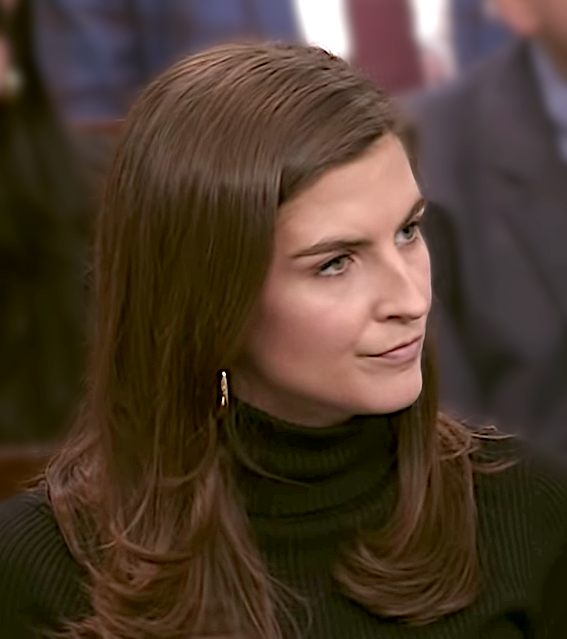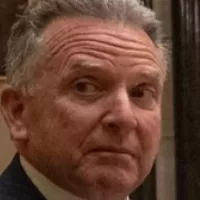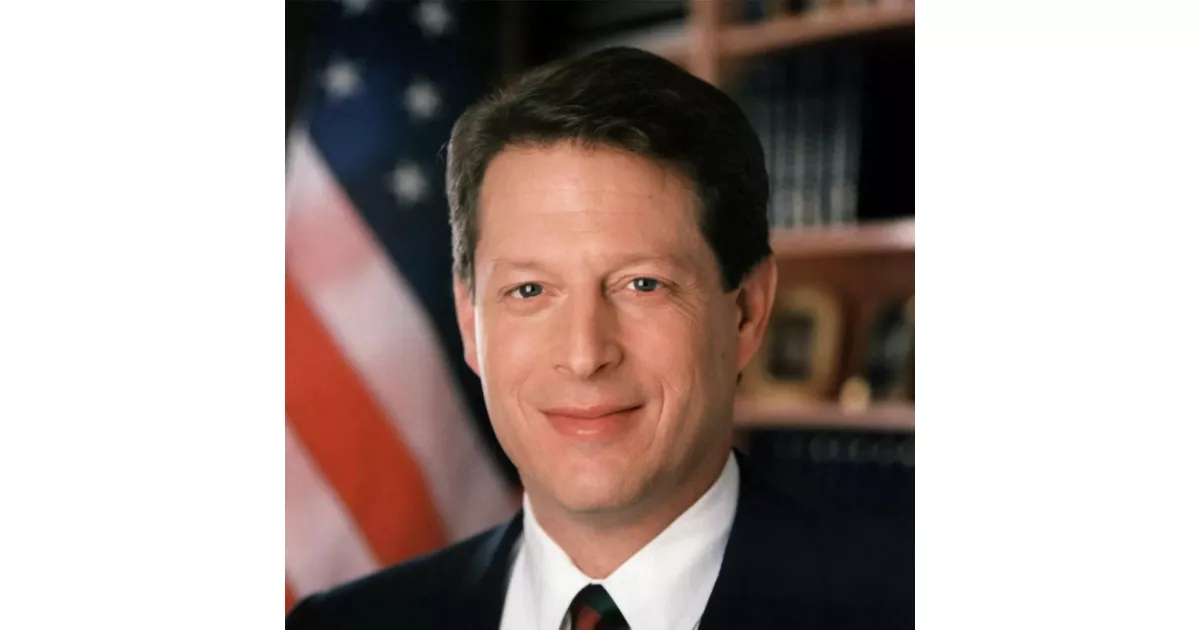From career breakthroughs to professional milestones, explore how Al Gore made an impact.
Al Gore served as the 45th U.S. Vice President under Bill Clinton (1993-2001). Prior to that, he represented Tennessee in both the House of Representatives (1977-1985) and the Senate (1985-1993). As the Democratic nominee in the 2000 presidential election, he lost to George W. Bush despite winning the popular vote. He is also a businessman and environmentalist.
1969: ARPANET deployed
In 1969, the ARPANET was deployed by Kleinrock and others and is the predecessor of the Internet.
1971: Investigative Reporter
In 1971, Al Gore began working as an investigative reporter for The Tennessean, investigating corruption among Nashville's Metro Council.
February 1976: Retirement Announcement
At the end of February 1976, U.S. Representative Joe L. Evins unexpectedly announced his retirement from Congress.
1976: Decided to Run for U.S. House
In 1976, Al Gore decided to run for a seat in the U.S. House of Representatives after learning that his father's former seat was about to be vacated, subsequently not completing law school.
1976: Ran for Representative
In 1976, Al Gore quit law school to run as a representative for Tennessee's 4th congressional district.
1976: Won Democratic Primary
In 1976, Al Gore won the Democratic primary for Tennessee's 4th congressional district.
1976: Congressional Hearings on Climate Change
In 1976, as a freshman congressman, Al Gore held the first congressional hearings on climate change and co-sponsored hearings on toxic waste and global warming.
1977: U.S. House of Representatives
In 1977, Al Gore became a member of the U.S. House of Representatives, representing Tennessee.
1977: Served in the House
In 1977, Al Gore began serving in the U.S. Congress at the age of 28.
1978: Joining the "futures group" in Congress
In 1978, Al Gore joined Newt Gingrich as part of a "futures group" in Congress, where they discussed ideas that began to materialize during the Clinton administration.
1978: Re-elected to the House
In 1978, Al Gore was re-elected to the U.S. House of Representatives.
March 19, 1979: First Member of Congress on C-SPAN
On March 19, 1979, Al Gore became the first member of Congress to appear on C-SPAN.
1980: Re-elected to the House
In 1980, Al Gore was re-elected to the U.S. House of Representatives.
1982: Introduction of the Gore Plan
In 1982, Al Gore introduced the Gore Plan for arms control, aimed at reducing the chances of a nuclear first strike by cutting multiple warheads and deploying single-warhead mobile launchers.
1982: Re-elected to the House
In 1982, Al Gore was re-elected to the U.S. House of Representatives.
1983: Promotion of High-Speed Telecommunications
As far back as the 1970s, Congressman Gore promoted the idea of high-speed telecommunications. In 1983, when the Internet was still in the early stages of its deployment, Congressman Gore provided intellectual leadership by helping create the vision of the potential benefits of high-speed computing and communication.
1984: Senate Race Remarks on Homosexuality
During his 1984 Senate race, Al Gore stated, "I do not believe it is simply an acceptable alternative that society should affirm," when discussing homosexuality, and that he would not take campaign funds from gay rights groups.
1984: Elected to the U.S. Senate
In 1984, Al Gore successfully ran for a seat in the U.S. Senate.
1985: U.S. Senator
In 1985, Al Gore became a U.S. Senator, representing Tennessee.
1985: Served in the Senate
In 1985, Al Gore began serving in the U.S. Senate.
1986: Introduction of Supercomputer Network Study Act
In 1986, Al Gore introduced the Supercomputer Network Study Act.
1987: Civil Rights Restoration Act
In 1987, Al Gore did not initially vote on the Civil Rights Restoration Act.
January 1988: Vote on Civil Rights Restoration Act
In January 1988, Al Gore did not initially vote on the Civil Rights Restoration Act of 1987, but he later voted to override President Reagan's veto the following March.
1988: Report on National Research Network
In 1988, Al Gore heard the report Toward a National Research Network submitted to Congress by a group chaired by UCLA professor of computer science, Leonard Kleinrock.
1988: Presidential Candidacy
In 1988, Al Gore sought the Democratic Party's nomination for President of the United States, carrying seven states in the primaries and finishing third overall. Michael Dukakis won the nomination but lost the general election to George H. W. Bush.
1988: Super Tuesday and Endorsement Controversy
In 1988, twelve southern states held their primaries on Super Tuesday. Jesse Jackson defeated Gore in South Carolina. Gore split the Southern vote with Jackson. Gore was later endorsed by New York City Mayor Ed Koch who made statements in favor of Israel and against Jackson. Due to Koch's statements and attacks against Jackson, Dukakis, and others, Gore received only 10% of the vote in the New York primary. Gore then dropped out of the race.
1990: Re-elected to U.S. Senate
In 1990, Al Gore won re-election to the U.S. Senate, representing Tennessee.
1990: Global Marshall Plan Conference
In 1990, Senator Al Gore presided over a three-day conference with legislators from over 42 countries which sought to create a Global Marshall Plan, under which industrial nations would help less developed countries grow economically while still protecting the environment.
August 1991: Decision Not to Run for President
In August 1991, Al Gore announced that his son's accident was a factor in his decision not to run for president in 1992, citing his responsibility to his children.
December 9, 1991: Passage of High Performance Computing Act
On December 9, 1991, the High Performance Computing Act of 1991 (commonly referred to as "The Gore Bill") was passed, leading to the National Information Infrastructure (NII), which Gore referred to as the "information superhighway".
1991: Support for the Gulf War
In 1991, Al Gore was one of ten Democrats who supported the Gulf War.
1991: Vote on Persian Gulf War Resolution
In 1991, Al Gore, then a U.S. Senator, was one of a handful of Democrats who voted in favor of the resolution endorsing the Persian Gulf War.
July 17, 1992: Nomination at Democratic National Convention
On July 17, 1992, Clinton and Gore accepted the nomination at the Democratic National Convention. The New York Times noted that if elected, Clinton and Gore would be the "youngest team to make it to the White House in the country's history".
1992: Earth in the Balance
In 1991 Gore wrote Earth in the Balance, a text that became the first book written by a sitting U.S. Senator to make The New York Times Best Seller list since John F. Kennedy's Profiles in Courage.
1992: Acceptance of Vice Presidential Nomination
In 1992, Al Gore decided to accept the offer to be Bill Clinton's running mate for the United States presidential election. Clinton chose Gore due to his foreign policy experience, work with the environment, and commitment to his family.
1992: Support from Jesse Jackson
In 1992, Al Gore mended fences with Jesse Jackson, who supported the Clinton-Gore ticket.
1992: Defeated Bush and Quayle
In 1992, Al Gore served as vice president during the Clinton administration, defeating then-incumbents George H. W. Bush and Dan Quayle.
1992: Speech on the Gulf War
In a 1992 speech on the Gulf War, Al Gore stated that he twice attempted to get the U.S. government to pull the plug on support to Saddam Hussein, but was opposed both times by the Reagan and Bush administrations.
January 20, 1993: Inauguration as Vice President
On January 20, 1993, Al Gore was inaugurated as Vice President during the Clinton administration. Clinton involved Gore in decision-making to an unprecedented degree for a vice president, making him the president's "indisputable chief adviser".
1993: Vice President of the United States
In 1993, Al Gore became the 45th Vice President of the United States under President Bill Clinton.
1993: End of Congressional Service
In 1993, Al Gore's 16-year period in the U.S. Congress came to an end.
1993: Tensions in the White House
Since 1993, the White House saw "three-way tensions" due to Hillary Clinton's candidacy for the open Senate seat in New York, which was exacerbated during Al Gore's 1999 Presidential campaign.
January 11, 1994: Speech at The Superhighway Summit
On January 11, 1994, Al Gore discussed his plans to emphasize information technology at UCLA in a speech at The Superhighway Summit.
March 29, 1994: Inaugural Keynote to Georgetown University Symposium
On March 29, 1994, Al Gore delivered the inaugural keynote address at a Georgetown University symposium on governmental reform, titled "The new job of the federal executive". In his lecture, Gore discussed how technology was changing government and public administration, and how access to information was facilitating flatter management structures.
1995: Promotion of Information Technology
According to Leslie Budd, Al Gore continued his role as an Atari Democrat, promoting the development of information technology from 1995 to 2001, which led to the dot-com boom.
November 5, 1996: Re-elected as Vice President
On November 5, 1996, Bill Clinton and Al Gore were re-elected as president and vice-president with 379 electoral votes and an 8% margin of victory in the popular vote.
1996: Defeated Dole and Kemp
In 1996, Al Gore served as vice president during the Clinton administration, defeating Bob Dole and Jack Kemp.
January 1998: Talk of Potential Run
There was talk of a potential run in the 2000 presidential race by Al Gore as early as January 1998.
1998: Objection to Anwar Ibrahim's Jailing
In 1998, at a conference of APEC hosted by Malaysia, Al Gore objected to the indictment, arrest and jailing of Prime Minister Mahathir Mohamad's longtime second-in-command Anwar Ibrahim.
April 1999: "Clinton fatigue" Study
In April 1999, a study by the Pew Research Center for the People found that respondents suffered from "Clinton fatigue", potentially impacting Al Gore's presidential campaign.
June 16, 1999: Presidential Candidacy Announcement
On June 16, 1999, in Carthage, Tennessee, Al Gore formally announced his candidacy for president, focusing on strengthening the American family. The announcement was briefly interrupted by AIDS protesters.
March 9, 2000: Bradley Withdraws Campaign
On March 9, 2000, Bill Bradley withdrew his campaign and endorsed Al Gore after failing to win any of the first 20 primaries and caucuses in the election process.
August 13, 2000: Lieberman Selected as Running Mate
On August 13, 2000, Al Gore announced that he had selected Senator Joe Lieberman of Connecticut as his vice presidential running mate, the first person of the Jewish faith to run for the nation's second-highest office.
2000: Change in Policies
Al Gore's policies changed substantially in 2000, reflecting his eight years as vice president.
2000: Shift in Political Positions
Al Gore's position as a moderate, and on policies related to that label, shifted later in life after he became Vice President and ran for president in 2000.
2000: Gore's Unsuccessful presidential bid
In 2000, Al Gore had an unsuccessful presidential bid.
2000: Democratic Presidential Nominee
In 2000, Al Gore was the Democratic nominee for President of the United States, ultimately losing to George W. Bush despite winning the popular vote.
2000: Campaign Chairwoman
In 2000, Donna Brazile was Gore's campaign chairwoman.
2000: 2000 Presidential Election Loss
In the 2000 presidential election, Al Gore lost the electoral college vote to George W. Bush despite winning the popular vote. The election concluded after the Supreme Court ruled in Bush v. Gore.
2001: Promotion of Information Technology
According to Leslie Budd, Al Gore continued his role as an Atari Democrat, promoting the development of information technology from 1995 to 2001, which led to the dot-com boom.
2001: Author and Environmental Activist
After his vice presidency ended in 2001, Al Gore remained prominent as an author and environmental activist.
2001: End of Vice Presidency
In 2001, Al Gore's term as Vice President of the United States came to an end.
December 2002: Consideration and decision not to run in 2004
In December 2002, Al Gore seriously considered challenging George W. Bush in 2004. However, the September 11 attacks and Bush's subsequent rise in popularity were strong factors in Gore's decision not to run again in 2004.
December 16, 2002: Announcement of not running in 2004 presidential election
On December 16, 2002, Al Gore announced that he would not run in the 2004 U.S. presidential election. This decision was influenced by the September 11 attacks and the subsequent rise in President Bush's popularity.
2002: Criticism of Bush Administration's rush to war
Beginning in 2002, Al Gore began to publicly criticize the Bush administration. In a September 23 speech to the Commonwealth Club of California, Gore criticized Bush and Congress for rushing to war in Iraq, contrasting it with the 1991 Persian Gulf War.
December 2003: Endorsement of Howard Dean for president
In December 2003, Al Gore endorsed Vermont governor Howard Dean for the 2004 U.S. presidential election. This decision was criticized by other Democratic contenders, particularly because Gore did not endorse his former running mate, Joe Lieberman.
March 2004: Endorsement of John Kerry and donation of funds
In March 2004, Al Gore endorsed John Kerry for president and gave Kerry $6 million in funds left over from his own unsuccessful 2000 bid.
2004: Supporters' draft campaign
Despite Al Gore taking himself out of the race, a handful of his supporters formed a national campaign to draft him into running in 2004, though this movement failed to convince Gore to run.
2004: Co-launched Generation Investment Management
In 2004, Al Gore co-launched Generation Investment Management, a company for which he serves as chair.
2004: Accusation of Bush using 9/11 attacks for Iraq invasion
In 2004, during the presidential election, Al Gore accused George W. Bush of betraying the country by using the 9/11 attacks as a justification for the invasion of Iraq.
2005: Criticism of Bush administration's response to Hurricane Katrina
In 2005, Al Gore criticized the Bush administration's response to Hurricane Katrina. Following Hurricane Katrina, Gore chartered two planes to evacuate 270 people from New Orleans.
2005: Evacuation of patients from Charity Hospital in New Orleans
In 2005, after being contacted by Dr. David Kline of Charity Hospital, Al Gore arranged for the evacuation of 270 patients from Charity Hospital in New Orleans to Tennessee following Hurricane Katrina. The evacuation took place on September 3 and 4, 2005 and was facilitated by two airlines and medically staffed by volunteers. Gore personally committed financially to the effort and used his influence to expedite landing rights.
2006: Increased popularity after 'An Inconvenient Truth'
From 2006, the prospect of a Gore candidacy arose, due in part to his increased popularity after the release of the 2006 documentary, An Inconvenient Truth.
2006: Criticism of domestic wiretaps and treatment of Arabs
In 2006, Al Gore criticized President Bush's use of domestic wiretaps without a warrant. Later that year, at the Jeddah Economic Forum, Gore criticized the treatment of Arabs in the U.S. after 9/11, expressing that the abuses did not represent the desires or feelings of the majority of Americans.
2006: An Inconvenient Truth Documentary Release
In 2006, Al Gore starred in the documentary "An Inconvenient Truth".
2007: Nobel Peace Prize
In 2007, Al Gore and the IPCC jointly won the Nobel Peace Prize for their work in climate change activism.
2007: Publication of "The Assault on Reason"
In 2007, Al Gore published his book, "The Assault on Reason", which analyzes the decline of civic discourse during the Bush administration, attributing it to the influence of television. Gore argued that the Internet could revitalize representative democracy.
2007: Nobel Peace Prize and Emmy Award
In 2007, Al Gore received the Nobel Peace Prize and a Primetime Emmy Award for Current TV.
June 3, 2008: Obama Becomes Presumptive Democratic Nominee
On June 3, 2008, when Barack Obama became the presumptive Democratic nominee for president, speculation began that Al Gore might be tapped for the vice presidency.
June 16, 2008: Gore Endorses Obama
On June 16, 2008, Al Gore endorsed Barack Obama in a speech given in Detroit, Michigan, one week after Hillary Clinton had suspended her campaign. This endorsement renewed speculation of an Obama-Gore ticket, but Gore stated that he was not interested in being vice president again.
December 9, 2008: Meeting with Obama and Biden
On December 9, 2008, after Obama was elected president, Al Gore met with Barack Obama and Joe Biden in Chicago, enhancing speculation that Gore would be named a member of the Obama administration. However, the only subject under discussion was the climate crisis, and Gore would not be joining the Obama administration.
December 19, 2008: Gore Praises Obama's Environmental Choices
On December 19, 2008, Al Gore described Barack Obama's environmental administrative choices of Carol Browner, Steven Chu, and Lisa Jackson as "an exceptional team to lead the fight against the climate crisis".
2008: Speculation of presidential candidacy during the Oscars
Between 2006 and early 2008, speculation arose about a possible Gore candidacy in light of the upcoming 2008 presidential election, increasing after "An Inconvenient Truth" won the Academy Award for Best Documentary. During the 79th Academy Awards ceremony, Gore and actor Leonardo DiCaprio shared the stage to speak about the "greening" of the ceremony and Gore hinted at a presidential run before being drowned out by music in a rehearsed gag.
2008: Argument against same-sex marriage ban
In 2008, Al Gore argued against the ban of same-sex marriage on his Current TV website, advocating for equal rights for gay men and women to make contracts, have hospital visiting rights, and marry.
2009: Commentary on Dick Cheney's criticism of Obama administration
In 2009, Al Gore commented on former Vice President Dick Cheney's criticism of the Obama administration. Gore referenced his own delayed criticism of the Bush administrations, stating he waited two years after leaving office to make critical statements.
2010: Attended WE Day in Vancouver, Canada
In 2010, Al Gore attended WE Day in Vancouver, Canada, a WE Charity event.
2014: Speculation about 2016 presidential election
In 2014, interest arose about Al Gore running for the 2016 presidential election, although he did not declare any intention to do so.
2015: Continued speculation about 2016 presidential election
In 2015, speculation continued about Al Gore running for the 2016 presidential election, although he did not declare any intention to do so.
July 25, 2016: Gore Endorses Hillary Clinton
On July 25, 2016, Al Gore endorsed Hillary Clinton on the first day of that year's Democratic National Convention.
October 11, 2016: Gore Appears with Hillary Clinton at Rally
On October 11, 2016, Al Gore appeared with Hillary Clinton at a rally on Miami Dade College's Kendall Campus.
2016: Presidential election year with no Gore candidacy
In 2016, despite prior speculation, Al Gore did not declare any intention to run in the presidential election.
January 2017: Gore Revives Climate and Health Summit
In late January 2017, after a "Climate and Health Summit" which was originally going to be held by the Centers for Disease Control and Prevention, was cancelled without warning, Al Gore revived the summit, which was held by the Climate Reality Project without the support of the CDC.
2017: An Inconvenient Sequel: Truth to Power
In 2017, Al Gore was the subject of the documentary "An Inconvenient Sequel: Truth to Power".
May 2018: Member of Indian Government committee
In May 2018, Al Gore was included as a member of the Indian Government committee to coordinate year-long celebrations of Mahatma Gandhi's 150th birth anniversary.
October 2, 2019: 150th birth anniversary of Mahatma Gandhi
On October 2, 2019, Al Gore was a member of the Indian Government committee that coordinated the year-long celebrations of Mahatma Gandhi's 150th birth anniversary.
2020: Gore Helps Launch Climate TRACE
In 2020, Al Gore helped to launch Climate TRACE to independently monitor global greenhouse gas emissions.
November 2021: Gore Speaks at COP26
In November 2021, Al Gore spoke at the early stages of the 2021 United Nations Climate Change Conference (COP26) in Glasgow, Scotland.
2023: Only Presidential Candidate to Win Every Primary
As of 2023, Al Gore remains the only presidential candidate in American history who was not the incumbent president to win every single contest in his or her party primary.
2023: Vice-Presidential Debate Record
As of 2023, the Clinton-Gore vice-presidential debate against Vice President Dan Quayle, and Admiral James Stockdale remains the only televised Vice-Presidential debate with more than two participating candidates.
Mentioned in this timeline

Jesse Jackson is an American civil rights activist politician and...

Bill Clinton served as the nd U S President from...

Hillary Diane Rodham Clinton is a prominent American politician lawyer...

George W Bush the rd U S President - is...

Joe Biden is an American politician who served as the...

The White House located at Pennsylvania Avenue NW in Washington...
Trending

42 minutes ago US, Israel launch military operation against Iran, airstrikes kill leader, Gulf earthquake follows.

43 minutes ago Kaitlan Collins covers Bill Clinton's Epstein testimony and calls out Trump allies.

43 minutes ago Adam Levine and Behati Prinsloo: Navigating Cheating Allegations and Maintaining Relationship

43 minutes ago Brandi Carlile Honored as Time's 2026 Woman of the Year, Other News Emerge
Gabe Perreault is a Canadian-born American professional ice hockey player currently playing for the New York Rangers in the NHL...

44 minutes ago Steve Witkoff involved in tense Geneva meeting before US-Iran conflict escalation.
Popular

Jesse Jackson is an American civil rights activist politician and...

Hillary Diane Rodham Clinton is a prominent American politician lawyer...

Jim Carrey is a Canadian-American actor and comedian celebrated for...

XXXTentacion born Jahseh Dwayne Ricardo Onfroy was a controversial yet...

Kashyap Pramod Patel is an American lawyer who became the...

Michael Joseph Jackson the King of Pop was a highly...


